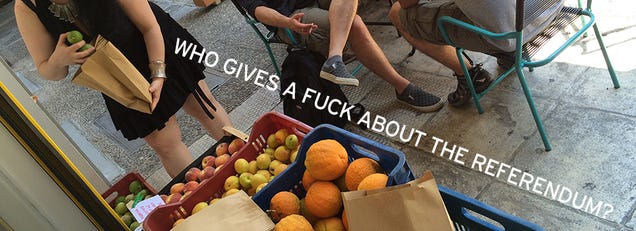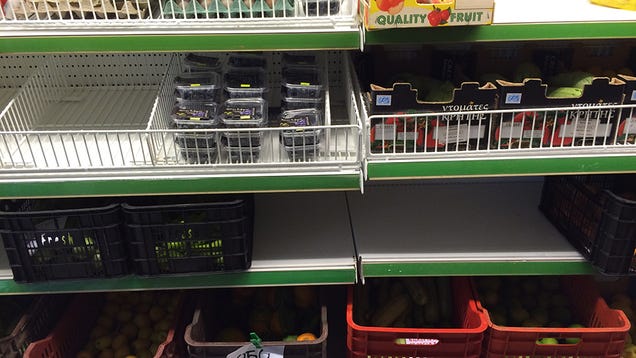
“You all have CSAs in the States, right? That’s amazing.”
I wasn’t entirely sure I fully understood what he was getting at. It was spring, 2012, and we were standing around at a squatted anarchist social center in a southern suburb of Athens, where I’d just given a talk on anarchism and Occupy Wall Street.
A few days earlier, in Syntagma Square opposite the Greek parliament building, a local retired man had shot himself in the middle of morning traffic. The note he left detailed his refusal to be a burden on his children as Greece’s economy spiraled, and called for young people to string up those responsible for its collapse. It made for a downright chilling read, even in translation.
“You mean, like…people buying shares in local farms?”
Back home in the U.S., Greek anarchists were celebrated for their perceived tenacity and bravado. Like giddy adolescents sharing pornography, left social media circulated YouTube clips of low-scale street warfare. (These days, the shared content is more likely to be various expressions of global panic over Greece’s potential exit from the euro.) It seemed unlikely that my companion wanted to talk to me about community-supported agriculture, the veggies-in-a-box default practice of the boring, NPR-member mainstream liberal. And yet, he did.
This was before the ascendancy of Syriza, and before Syriza’s prospects for negotiating some economic relief disappeared. A default on IMF debt repayments now seems inevitable, and an exit from the Euro seems more likely by the day. Much faith has been put in Syriza as a sort of leftist foil to late European austerity-not just in Greece, but throughout the world-and Syriza’s ambitions would have been crushed rather swiftly, were the party not willing to play the country’s exit from the continental currency (and the ripple effect that would have for financial markets the world over) like a poker chip. http://fortressamerica.gawker.com/how-the-lefts-…
While liberal and left-wing Americans stare distastefully and apprehensively at their pitiful… Read more Read more
All of this, of course, after months of domestic expectation-management from Syriza’s camp, paired with frequent slander of the very social movements on whose rhetoric the party rode to electoral victories-victories whose ends prove increasingly elusive.
But in Athens, right now, the saga appears to have resulted in a certain fatigue on the ground. Life goes on, looking much as it would’ve otherwise, beyond the occasional, small line at an ATM-or the dueling yes/no referendum rallies in Syntagma, both ends of that contrast as likely a response to relentless humiliation as they are anything else.
Monday night, as the “no” gathering in Syntagma swelled, residents in the Agia Pereskevi neighborhood gathered to discuss a scheduled day of events for this coming Sunday; events mostly for local children. These activities would coincide (however unintentionally) with the proposed referendum on the EU’s austerity proposal, and it seemed intuitive that a change of plans might be in order.
I casually browsed Twitter on my phone, watching the world collectively soil its pants over Greece’s situation, while a friend whispered translations of the discussion over my shoulder. At one point, one woman put a point to what was both the overriding sentiment, and a question well worth asking, given what’s unfolded in Greece for the better part of a decade, now: “Who gives a fuck about the referendum?”
In the wake of the 2008 uprising that swept the country following both the police shooting of a teenager in the central neighborhood of Exarchia and Greece’s economic free-fall, horizontal, community self-management became both a practice and a demand. Popular assemblies-like the one in Aghia Pereskevi-formed in roughly seventy neighborhoods throughout metropolitan Athens, some within occupied government buildings.
Earlier this year, The Guardian reported on how these structures are serving to “fill the gaps left by austerity.” A variety of what would’ve been called survival programs in the era of the Black Panther Party have been carried out through such assemblies across Athens: food and clothing distribution, supplementary education programs for children, basic health services, mental health support, eviction defense – all administered via face-to-face, direct democracy.
When a tax increase folded into electricity bills resulted in cutoffs for people unable to pay, lists were made and local electricians were dispatched to illegally restore services, with priority afforded to those most vulnerable (the elderly, new parents). A former military installation seized by residents and converted into a community park and cultural center boasted sizeable gardens, tended by locals of varying ages.
When I visited one of the city’s oldest popular assemblies in 2012, in the neighborhood of Petralona, residents had just opened a kitchen space on one street corner, with the intention of both providing affordable meals and educating young people about food cultivation, preparation, and health. Participation in all of it seemed pretty eclectic, to my outsider eye. Even local government officials joined in-acting as residents like any others, sometimes with their families in tow. Perhaps even more telling, assemblies were sharing resources between neighborhoods. They were confederating, demonstrating both an ability and an intention to scale up.
Taking all of this in, my anarchist acquaintance’s interest in community-supported agriculture that night in 2012 started to make sense. It makes even mores sense now. With the IMF and Troika twisting arms, threatening empty store shelves if its various austerity programs aren’t adopted, direct relations with local agricultural production offer a keenly radical possibility.
Channeling that possibility, a ten person collective opened a grocery and coffee bar on the edge of the central Athens neighborhood of Exarchia.
“There was a time when people didn’t have much of a relationship with the villages their families were from – specifically the land their families cultivated” a woman working in the collective explained to me (she asked to keep her name out of this piece; police and fascists are real threats in Greece). “With the crisis, you started seeing people opt to plant on land in their villages. [The grocery store] was a way of consolidating and making available what we were producing.”

Financed by a loan from a network of worker self-managed businesses scattered throughout Exarchia (mostly cafes and restaurants), the project-organized democratically, on the same consensus model that drove the Occupy movement in the US-served a threefold purpose.
“The first objective was to support ourselves; those of us whose families were producing food items in their villages, as families, not using employees” the woman told me. Basic needs. Tomatoes. Flour. Olive oil.
“The second was to support people politically close to us, to create a workplace that could serve as a safety net and provide transitional work for people who’d lost jobs.” One such woman made my espresso freddo Monday morning. A graphic designer by trade, she’d been fired her first day back from the eight months of maternity leave to which Greeks are entitled-a warning to any other staff entertaining such audacity.
“The third was to provide food produced in ways consistent with our principles.” In the last decade, organic products saw something of a boom in Greece. “The primary focus was health, meanwhile these things were being produced by Pakastani immigrants with no job security, under horrible conditions. Some were killed. Our position was that a ‘healthy’ carrot produced in this way has no meaning, at all.”
The café represents an attempt to forge networked relationships-real sustenance-unfettered by faith in conventional politics, that gives instance to an altogether distinct vision for Greece. As a founding member of the Agia Pereskevi assembly told me over coffee this week, “This is what sets us apart from the traditional left – there is no doing for; we are the people whose lives are affected. And we’re taking on transformations that affect our lives.”
While these sometimes small projects, and much of what Greek popular assemblies have carried out could be viewed as triage out-scaled by the gaps left by austerity demands, that’s never been the view of participants I’ve spoken with. With real consistency, they’ve seen themselves engaged in something prefigurative; forging new ways of organizing social life – life that will continue with or without the euro. And they’ve done so with considerable ingenuity, commitment, and (most importantly) success.
Finding myself back in Athens as the world’s gaze is cast back in its direction, with the clock ticking on the future of high politics in Greece and its relationship with the rest of the world, it seems fitting to counter the pummeling global humiliation to which Greeks are being subjected with some of what’s been done right in Greece since the crisis (none of it by anyone whose name you’ve heard). Because if we’re being even remotely honest, what titillates us most about this unfolding drama is not the great uncertainty that hovers over Greece, but that it invites us to look into our own future.
Editor’s note: Due to concerns about violent retaliation, we edited this piece after publication to remove proper names of venues and cut or crop photographs that clearly identified people. Joshua Stephens is a writer in an open relationship with Brooklyn, NY. His work has appeared in AlterNet, Truthout, Waging Nonviolence, and Perspectives on Anarchist Theory. He is the author of The Dog Walker: An Anarchist’s Encounters with the Good, the Bad, and the Canine, forthcoming from Melville House.

